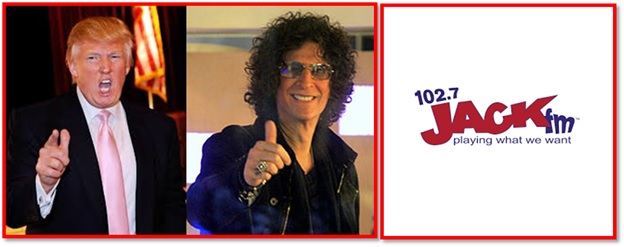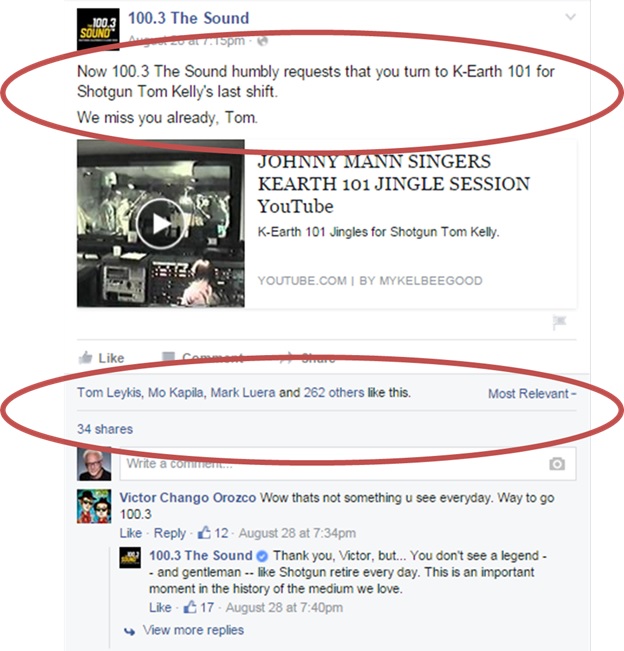Now that the Donald Trump campaign is showing continued signs that not only it isn’t going away, but looks to be competitive for the foreseeable future, understanding the media’s fascination with the phenomenon is instructive to all of us in radio.
Everywhere the pundits turn, Trump is proving that breaking the well-defined rules of politics is an effective strategy. He is showing – at least at this early stage of the race – that bombast, confidence, arrogance, and even snark can work. The Donald says outrageous things, and unlike the political animals we’ve grown up with, doesn’t later walk them back or apologize for saying them. He defends them and brushes off his critics and his opponents as being small-minded or stupid.
He doesn’t need to conduct research or dig up facts to back up his assertions. Trump lets his business success (and even that is in dispute) and his wealth speak for itself. Of course, he’s right. He says so.
Trump’s “Doing What I Want” plan pulls out the table cloth, the china goes flying, and the voters (so far) can’t get enough of it.
Where have we seen this unabashed breaking of the rules work in media and marketing?
Well, right here in Radioville for the past couple decades.
Perhaps it started with Howard Stern (“Saying what I want”). Donald Trump is systematically using the Stern playbook to prove that outrage and an anti-Morning Zoo approach is exactly what the public wants. Stern’s outrageous, unapologetic attacks on established morning shows (think established Republican candidates) got everyone talking, and rethinking what radio entertainment was all about.
Jack-FM had the same impact when it hit the radio dial back around 2000 first in Canada, and then here in the States. Their “Playing What We Want” approach flew in the face of conventional radio formats, confounding researchers and consultants (guilty as charged). The analogy of incessant rule-breaking, convention-bending, and in your face snark and bombast are the common elements that audiences – or voters – continue to respond to.
And yet, most radio stations continue to lug out the tired, musty rule book every time there’s a key strategic decision to be made. More often than not, broadcasters default to the tried and true, even though it is likely to gain consumer attention.
In this environment, attention is the new commerce. Trump has proved that, and his outrageous style has vaulted him past the other 16 declared Republican candidates. The media cannot get enough of him because, of course, covering him drives ratings.
Stern leapfrogged past his competitors in the same way because he understood the value of being noticed and talked about.
But you don’t need to hire outrageous personalities or make unrealistic claims in order to gain attention. By systematically and strategically breaking the rules, and veering left when everyone’s turning right, any brand can crack the code for what it takes to earn the spotlight.
A case in point occurred just a few days ago. As KRTH downsized the legendary Shotgun Tom Kelly, reducing him to “ambassador” status, the moment to break the rules was seized by Entercom’s KSWD (The Sound) in Los Angeles:
That’s right – in the middle of a PPM week, The Sound was asking people to turn on the station across the street. Crazy? Over the top? Risky? Classy.
Breaking the rules…with a strategic purpose.
That’s how you get attention…and votes.
- What To Do If Your Radio Station Goes Through A Midlife Crisis - April 25, 2025
- A 2020 Lesson?It Could All Be Gone In A Flash - April 24, 2025
- How AI Can Give Radio Personalities More…PERSONALITY - April 23, 2025







Breaking the rules – great article Fred!
Thanks much, Terry, and thanks for reading our blog.
Bravos, Fred. You’ve done a wonderful job of capturing the zeitgeist.
My thought is Trump has a deep understanding of the art which political consultants call “optics.” He knows the objective of every campaign is to create contrast. Moreover, he enjoys the advantage of decades of learning how to handle the media effectively. The Donald knows politicians and the press have a naturally adversarial relationship. He knows with the media you are always on defense. However, he plays with the goal of driving and controlling the agenda. Further, he is aware if he gets the audience to pull for him; he’ll win.
Trump is a great salesperson, a showman that knows how to make good copy. He’s a skilled prime-time performer cognizant of Valerie Geller’s monition “Never be boring.” Accordingly, he’s become media catnip.
Trump is also dialed-in to the ongoing conversation that is social media and has used Twitter deftly, making the real-time platform his primary communications channel. He’s chosen wisely, grasping the importance of making his remarks highly visible and easy to share.
Finally, let me also offer kudos to Dave Beasing and the team at The Sound. Their promotional hat tip to Shotgun Tom Kelly brings to mind the so-called “Storz Rule of Three,” which counsels…good programming is always “Obvious. Topical. Local.”
Dave, spot-on assessment of the Trump phenomenon. And all those attributes would serve radio well. And you can see why the Beasing/KSWD move jumped at me as we were preparing this post. As always, thanks for adding to the conversation.
Great analogy Trump strategy and the Stern rise to fame. In today’s radio landscape all rivers run parallel. Standing out from the norm is alive and well in the North Country. WQON in Grayling Michigan (Q100 ” THE ONLY PLACE FOR ROCK &ROLL), is implementing that strategy and it is working very well. The “Q” has a play list of 5500 songs; (60 years of R&R everything from Elvis to the Killers). The results are amazing, it is the number one streaming music station in Northern Michigan by a large margin. The station has enjoyed significant revenue growth over it’s short three year existence. It used to be called AOR, a format that established FM radio with a music featuring Rock &Roll. Playing a variety of artist’s work from deep into the albums. Using the DJ’s musical knowledge and connection to their audience to present an entertaining show that the listener made appointment listening. The amount of success that your station hopes to achieve is subject to the risk you are willing to take. Ask “The Donald”, and Howard!
Buzz, great to hear from you and thanks for the kind words and the great mid-Michigan success story. Risk : reward, right?
Let’s move this forward and pretend Trump gets elected President. I hope our country has a better follow-up plan for his successor than what radio had for Stern. Free FM, anyone?
Mike, can’t we just move on? 🙂
Thanks for the comment.
Fred, with all due respect the whole Jack-FM thing is a bit dated now isn’t it. Where is it winning today?. This is a very highly researched and marketed format, not something revolutionary. The problem is the gap between the real world and the radio world. To the the typical purveyors of pablum AC or Classic Hits, Jack was fresh and innovative instead of vanilla. However its 2015 where is all this creativity?. Don’t you have any other examples?
Mike, thanks for commenting on the Trump post. The Jack example wasn’t served up as something necessarily current but as indicative of winning via rule breaking. And BTW in markets as diverse as Austin, Knoxville, Seattle, Phoenix, and others, the format is still viable.
As for new innovations in radio, we showcase them every Friday in our “Radio’s Most Innovative” initiative.